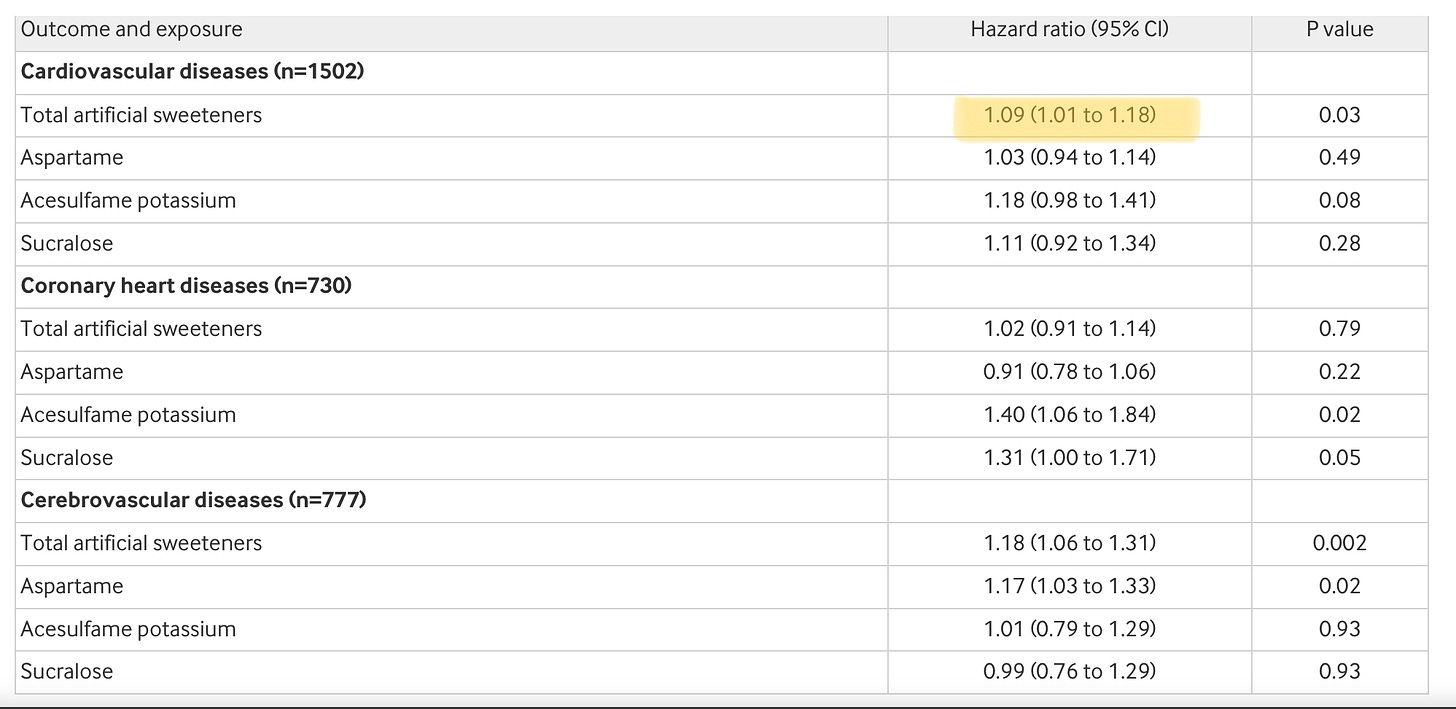So much of medicine is practiced within a shroud of mystery. When it comes to artificial sweeteners, an enigma that long has confounded me is: Why would anyone want to drink a Diet Coke? I’ve learned to allow my patients to have strange tastes in beverages. Should I be tolerant towards their drive to consume artificially sweetened foods and drinks, though? A new study joins a mixed bag of older research which suggests that I should not. I don’t think my Splenda-swilling patients have cause for alarm, however.
The work, published in the British Medical Journal, tracked over 100,000 French adults prospectively for more than a decade. Dietary consumption of several artificial sweeteners, primarily aspartame (Equal/Nutrasweet), acesulfame potassium (Sunett/Sweet One) and sucralose (Splenda), was determined via questionnaire, and then health outcomes in regard to heart events like anginal pain, stent, or heart attack, or brain events like TIA or stroke were followed both through participant report (with physician confirmation) and national health records.
A rather nice study design, and ample size over a long enough study period to accumulate a significant number of events. True, as with any observational trial, there is risk of missed or mis-labeled events, mis-classified participants, statistical massage with multiple end points, and, of course, the potential for confounding: people who choose to reach for Splenda packets in lieu of the honey jar might just be inherently more or less healthy than their peers in ways that are hard to control for even when demographics and lifestyle differences are taken into account.
What they found was a rather modest increase in cardiovascular events among those who consumed artificial sweeteners. Indeed, it barely reached statistical significance for the composite measure:
The results are hardly surprising. Earlier meta-analyses have found mixed results for artificial sweeteners in metabolic health; among the small randomized controlled trials for artificial sweeteners — often run by industry — there is a slight positive trend, while larger observational studies trend towards worse outcomes.
What might be the mechanism for this? It runs counter to the indoctrination of the American public since the 1960s that sugar-free treats are a fine part of a weight-loss diet. However, most things in the world that seem too good to be true turn out to truly not be that good. Whatever you think of their taste (I find them all abominable, personally), from a health perspective, artificial sweeteners have their fair share of flaws.
A theory often postulated is that artificial sweeteners deleteriously alter the gut biome. A randomized controlled human study found that four non-nutritive sweeteners (saccharin, sucralose, aspartame and stevia) indeed altered bacterial composition in the gut, and sucralose and saccharin caused worsening response to actual sugar loads. Please note the inclusion of stevia in that study – “natural” non-nutritive sweeteners are not exempt from these concerns.
It’s also been hypothesized that fooling our brain and bodies with false sweetness could lead to problems. Sweet taste receptors in our endocrine system might be fooled by artificial sweeteners, leading to disruptions in the release of critical metabolic hormones like insulin and incretins. Our behaviors centered around seeking out other carbohydrates might be altered, too; directly, if our brain does not give us “reward” feedback that it’s time to rest and stop seeking more food when we are not consuming actual calories, or indirectly, if we develop a worsening sweet tooth by accustoming ourselves to sweetness at every meal.
So, what’s a doctor to do? Well, the simplest advice is to avoid sweetened foods. I am now aware that this makes me a food-shaming monster, but let’s be real: I want people to live long and healthy lives, and high-sugar foods simply are not part of that plan. Fruit? Not in excess, and make sure it’s whole fruit (fiber-rich skin and all); we worry about high amounts of fructose gumming up the liver and perturbing metabolic health, too. Honey? It’s almost half fructose, so not as healthy as you might think. Good old table sugar, sucrose? It’s a mixture of fructose and glucose; the latter leans heavily on insulin to control blood glucose after a sugar load, and I don’t believe anyone thinks this is fine for your health.
The best approach for most people is to eat a predominantly savory diet. A motivated soul stuck on highly sweetened foods can slowly wean themself down if they’re patient. Two packets of Equal or teaspoons of sugar can become one, can become half, can become zero, over enough time, and — lo and behold — coffee is still delicious.
I know, I know: this stuff is hard. Some people don’t have the time or the bandwidth in their over-booked lives to add another challenge. Consider this advice aspirational, then.
Along those lines, back to the study. It’s worth noting that the absolute increase in risk of consuming artificial sweeteners was quite low, even if the relative risks hold statistical water and can be generalized outside of French 40-somethings . In their middle aged cohort, high consumers — who averaged about 2 packets of sweetener per day — had about 1 cardiovascular event every 290 person-years, while non-consumers spaced out their events only to about every 320 years. The average middle aged person would need to live over 3000 years to reap the benefits of that responsible choice to forego Nutrasweet. Put from a physician’s or nutritionist’s perspective, we’d have to counsel 60 patients each with 50 years of tread on their tires to avoid artificial sweeteners in order to prevent one cardiovascular event.
We’ve got bigger fish to fry. Hold the honey glaze on mine, please.
https://doctorbuzz.substack.com/p/are-fake-sugars-causing-real-disease

No comments:
Post a Comment
Note: Only a member of this blog may post a comment.